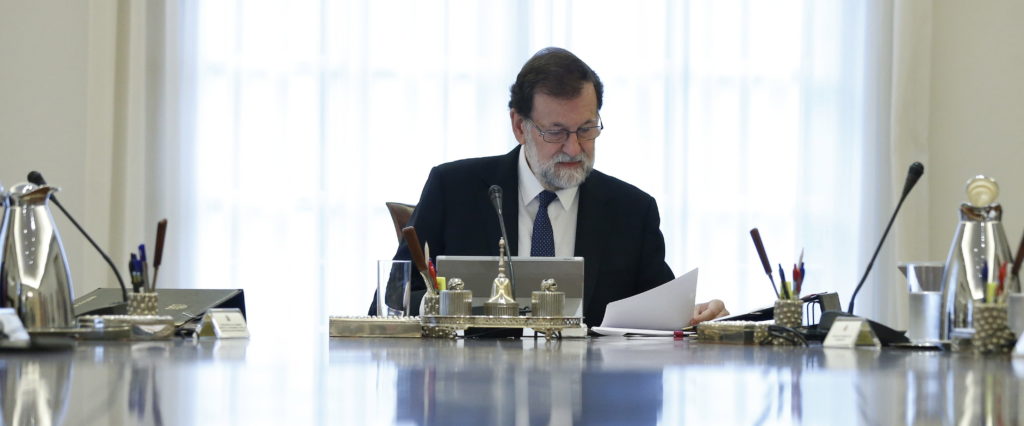23.10.2017 - 09:06
|
Actualització: 23.10.2017 - 09:07
PM Rajoy’s government has decided to wipe out Catalonia’s self-rule by resorting to an ad-hoc interpretation of Article 155 [of the Spanish Constitution] in what constitutes a modern version of the 18th century Nueva Planta decrees. They have given themselves carte blanche, ignoring the Spanish constitution and Catalonia’s Statute. With the PSOE and Ciudadanos as its accessories, the PP government has unilaterally razed Spain’s system of autonomous regions by replacing some of the pillars that held the edifice of devolution and stripping Catalonia of what little political power it still had.
In fact, Madrid’s euphemistic monitoring of Catalonia’s finances —brought in a few weeks ago— had already dealt a deadly blow to the political nature of Catalan autonomy, and now they have administered the coup de grâce by twisting Article 155 of the Constitution to pretend that it says precisely the opposite of what it states. Article 155 allows the Spanish government to “issue instructions” to any regional authorities (and that’s something!), but it does not exempt it from obeying the law and, therefore, any steps taken by Madrid and any instructions given must be lawful. And every measure announced by the Spanish cabinet contravenes Catalonia’s Statute, which is, in itself, a fundamental law of the Spanish State.
The Catalan Statute establishes that the president of the Generalitat must be an elected MP voted in by his or her fellow law-makers (Article 67.2) and among the possible reasons for their dismissal (Article 67.7) there is no mention of being removed from office by the Spanish prime minister or by a majority vote in Madrid’s senate. Only the president of the Generalitat may appoint or dismiss a cabinet minister (Article 17.1 of Law 13/2008). Calling a snap election is a political decision which the Statute reserves exclusively to the president (Article 75). This power is personal and cannot be transferred or delegated, as it is not within the purview of the president to do so. Furthermore, in the event of the president’s death or impeachment —following a sentence by a court of law—, the interim president (the vice president) would not be allowed to dissolve the parliament (Article 67.8). Rather, in that eventuality a new president would need to be picked by the Catalan chamber among the sitting MPs. Catalonia’s is the only government that can rule the Generalitat (Article 68.1)
As established by the Statute that has recently been butchered, the Spanish government may not veto the Catalan parliament’s activities, nor its powers to legislate, administer Catalonia’s finances and oversee the government’s policies (Article 55.2). These are only a few examples, but you could argue the same about commanding the Catalan police force and managing the public broadcasting corporation. What the Spanish government has done constitutes, in fact, an amendment of the Statute on the sly, ignoring every procedure enshrined in the Statute itself (Articles 222 and 223).
Once the measures adopted by the Spanish government have been approved by Madrid’s Senate, they will seek to implement them. But to actually set some of them in motion will require a modicum of cooperation that they won’t necessarily obtain, such as that of most Generalitat civil servants. Besides, if the general public in Catalonia massively protests these measures and they persevere in their protest, some will never be effectively applied and that might show that the Spanish government is no longer in control of the Catalan territory. The world might witness Spain’s inability to exercise its sovereign powers over Catalonia. And so, it might all backfire on them.
The Spanish government’s decision to invoke Article 155 in such a blatantly unlawful, unconstitutional manner leaves the Catalan Parliament but one dignified way forward: to formally declare independence (as established in the self-determination referendum law), which would automatically trigger two responses: the enactment of the law that will serve as a provisional constitution for Catalonia (the foundational law of legal transition of the Republic) and the start of the constituent process. Within six months.
It is not the first time that the Spanish government and other bodies claim to be upholding the law and the constitution when they are actually violating it flagrantly. The arrest of Jordi Cuixart and Jordi Sànchez is the latest example. But now Rajoy’s government has knocked down the master walls not merely of Spain’s regional system, but of the rule of law and, therefore, of Spanish democracy. Catalans should vacate the premises before the building collapses.
Marcel Mateu is Professor of Constitutional Law at the UOC, Catalonia’s Open University



